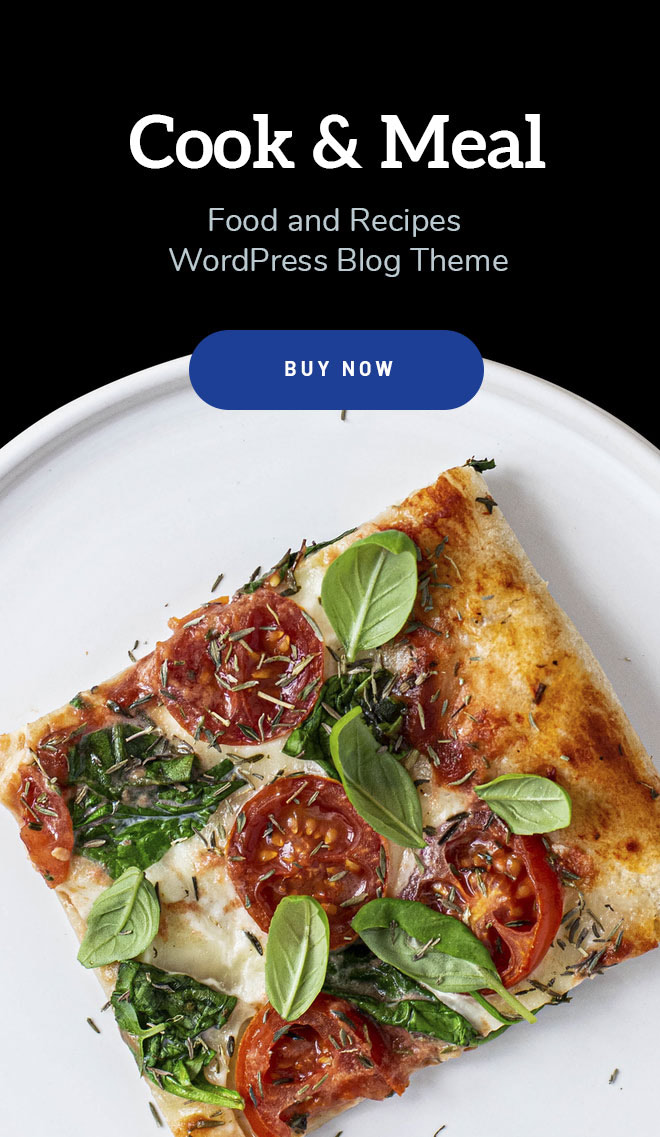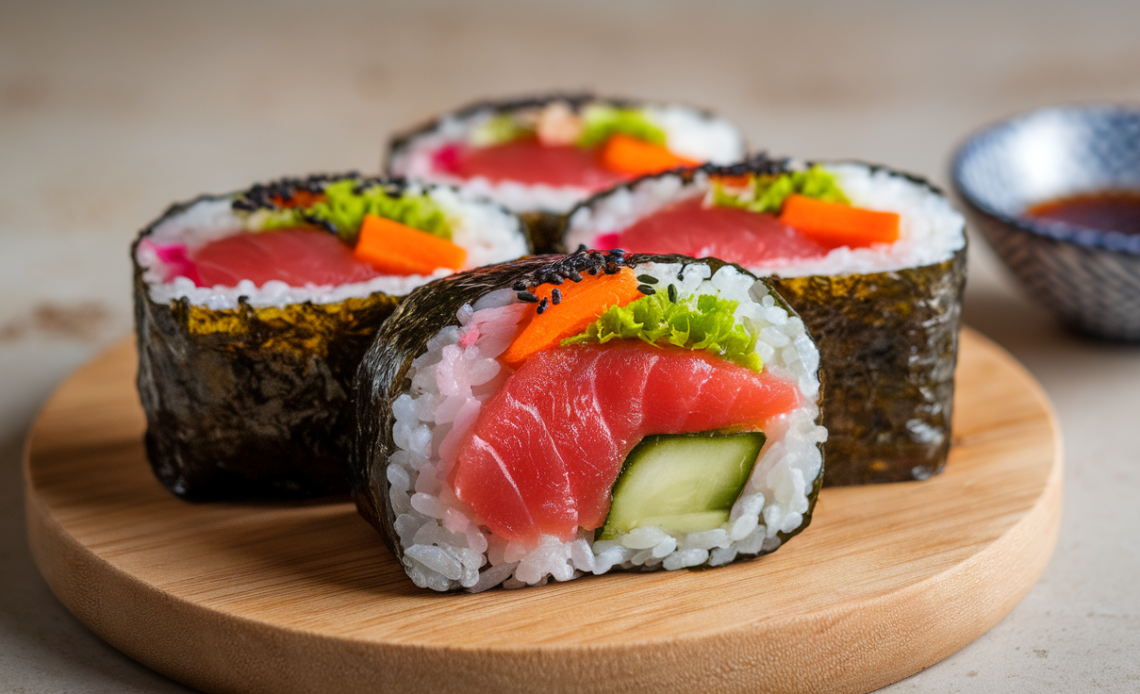
🍙 Introduction: A Bite-Sized Bundle of Joy
Somewhere between the delicious simplicity of sushi and the heartiness of a sandwich lies Kimbap (or Gimbap)—a beloved Korean dish made of seaweed-wrapped rice rolls packed with savory fillings. If you love the concept of sushi but want something easier, quicker, and more adaptable to everyday cooking, Spicy Tuna Kimbap is the ultimate answer.
This Korean comfort food is often served during family picnics, school lunches, and holiday gatherings. It’s a dish rooted in tradition, but with endless room for creativity. In this article, we’re diving deep into one of the most exciting Kimbap variations—Spicy Tuna Kimbap—a fusion roll that combines Korean spice with pantry-friendly ingredients.
With a prep time of under an hour, it’s perfect for meal prep, on-the-go lunches, picnic food, or as a unique party appetizer. You’ll walk away with not just a recipe, but the know-how to personalize it, pack it, and enjoy it any day of the week.
🧾 What Is Kimbap?
Kimbap is a traditional Korean dish consisting of rice (bap) and various fillings rolled in seaweed (kim/gim). At first glance, it resembles Japanese sushi, but it differs in several key ways:
| Sushi | Kimbap |
|---|---|
| Vinegar-seasoned rice | Sesame oil + salt-seasoned rice |
| Raw fish common | Mostly cooked or pickled fillings |
| Often dipped in soy sauce | Eaten as-is, no dipping required |
| Served fresh | Commonly packed for picnics or meals later |
In Korean culture, Kimbap is a go-to for school lunches, road trips, hiking meals, and picnics—wholesome, filling, and easy to pack. While traditional fillings include bulgogi beef, eggs, spinach, and pickled radish, the spicy tuna version is a modern twist that brings bold flavor with minimal prep.
⭐ Why You’ll Fall in Love with This Recipe
- ✅ Pantry-Friendly: Uses canned tuna and everyday ingredients
- ✅ Healthy & High Protein: Tuna, seaweed, and vegetables make a well-rounded meal
- ✅ Meal-Prep Hero: Make it ahead and refrigerate for up to 24 hours
- ✅ Picnic-Perfect: Holds up beautifully at room temperature
- ✅ Family-Approved: Kids love it (you can tone down the spice), and adults crave it
It’s not just a sushi roll—it’s a complete meal in one bite.
🛒 Ingredients You’ll Need
For the seasoned rice:
- 2 cups short-grain white rice, cooked
- 1 tbsp sesame oil
- ½ tsp salt
- 1 tsp toasted sesame seeds (optional)
For the spicy tuna mixture:
- 1 can (5 oz) tuna (in oil or water), drained
- 1½ tbsp gochujang (Korean red chili paste)
- 1 tbsp mayonnaise
- 1 tsp soy sauce
- ½ tsp sugar
- 1 tsp sesame oil
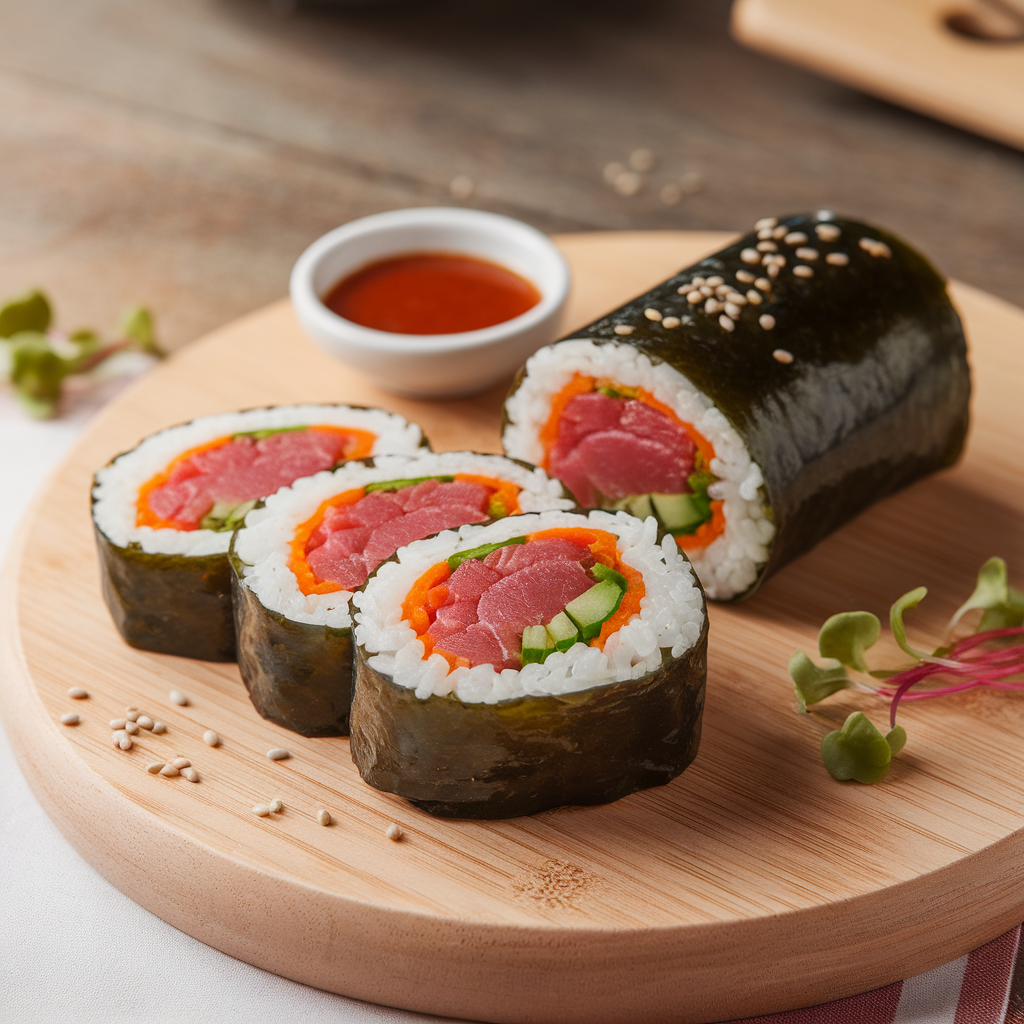
Vegetable & filling components:
- 1 medium carrot, julienned
- 1 tsp neutral oil (for sautéing)
- ½ tsp salt (for seasoning)
- 1 medium cucumber, cut into thin strips
- 4–5 slices yellow pickled radish (danmuji)
- 3 eggs, beaten and made into a thin omelet, then sliced
- Optional: perilla leaves or blanched spinach
To assemble:
- 5–6 sheets roasted seaweed (gim/nori)
- Sesame oil for brushing
- Bamboo sushi rolling mat
👩🍳 Step-by-Step Instructions
🥣 Step 1: Prepare the Rice
- Cook 2 cups of short-grain white rice. Let it cool until warm but not hot.
- Add 1 tbsp sesame oil, ½ tsp salt, and 1 tsp sesame seeds. Mix well and set aside, covered.
Pro Tip: Use freshly cooked rice that has cooled slightly; day-old rice becomes too dry to roll.
🐟 Step 2: Make the Spicy Tuna Filling
- In a small bowl, combine:
- Drained canned tuna
- 1½ tbsp gochujang
- 1 tbsp mayo
- 1 tsp soy sauce
- ½ tsp sugar
- 1 tsp sesame oil
- Mix until smooth and creamy. Taste and adjust heat or creaminess by adding more gochujang or mayo.
Optional: Add chopped green onions or crushed garlic for a flavor boost.
🥕 Step 3: Prep the Veggies & Omelet
- Carrots: Julienne, sprinkle with salt, rest 10 minutes, then sauté until just soft (1–2 minutes).
- Cucumber: Slice into matchsticks, pat dry.
- Egg: Beat 3 eggs, cook into a thin omelet, let cool, slice into long strips.
- Pickled Radish: Cut into long strips if not pre-sliced.
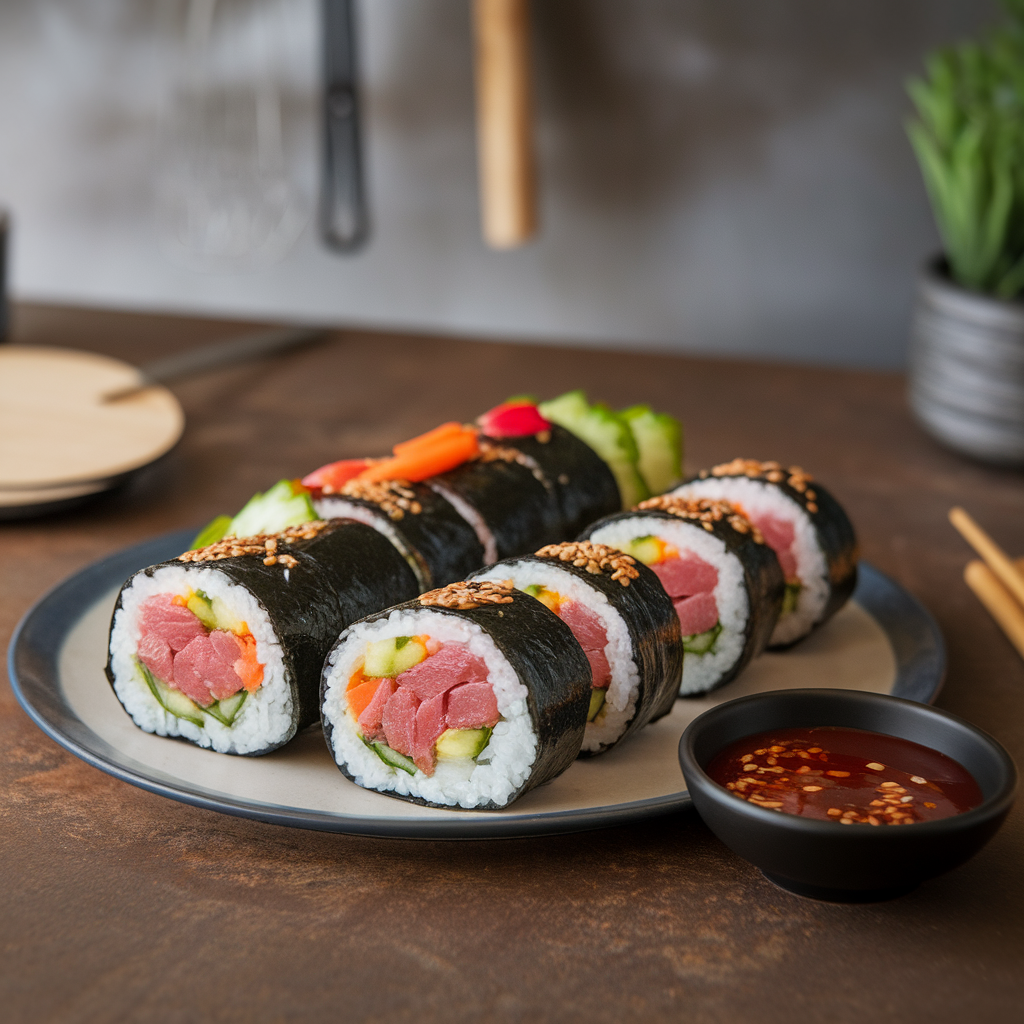
🍙 Step 4: Assemble the Rolls
- Place a seaweed sheet (shiny side down) on your bamboo mat.
- Spread about ¾ cup of rice across the sheet, leaving 1 inch at the top free.
- Horizontally layer your fillings in the center:
- Perilla leaf or spinach
- A spoonful of spicy tuna
- Carrots
- Cucumber
- Egg strips
- Pickled radish
- Use both hands to roll firmly from the bottom up, using the mat to press and shape.
- Seal the edge by pressing gently. Brush outside with sesame oil for flavor and shine.
🔪 Step 5: Slice & Serve
- Dip a sharp knife in water or oil, and slice rolls into ½-inch rounds.
- Wipe the blade between cuts for clean slices.
- Garnish with extra sesame seeds if desired.
🧊 Storage Tips
- Short-term (up to 24 hours): Wrap in cling film or place in an airtight container in the fridge.
- Not freezer-friendly: Seaweed and rice don’t hold up well when frozen.
- Reheat option: Pan-sear leftover Kimbap for a crispy, warm twist.
🔄 Substitutions & Variations
| Ingredient | Substitute |
|---|---|
| Tuna | Canned salmon, shredded chicken, tofu |
| Gochujang | Sriracha, chili flakes + soy sauce |
| Mayonnaise | Greek yogurt or vegan mayo |
| Short-grain rice | Sushi rice or brown rice |
| Egg | Omit for vegan version or use tofu scramble |
🥗 Make It a Full Meal
Pair with:
- 🥬 Kimchi – classic fermented side
- 🍲 Doenjang Jjigae – soybean paste soup
- 🍵 Barley Tea (Boricha) – a nutty Korean beverage
- 🥗 Seaweed Salad – light and fresh contrast
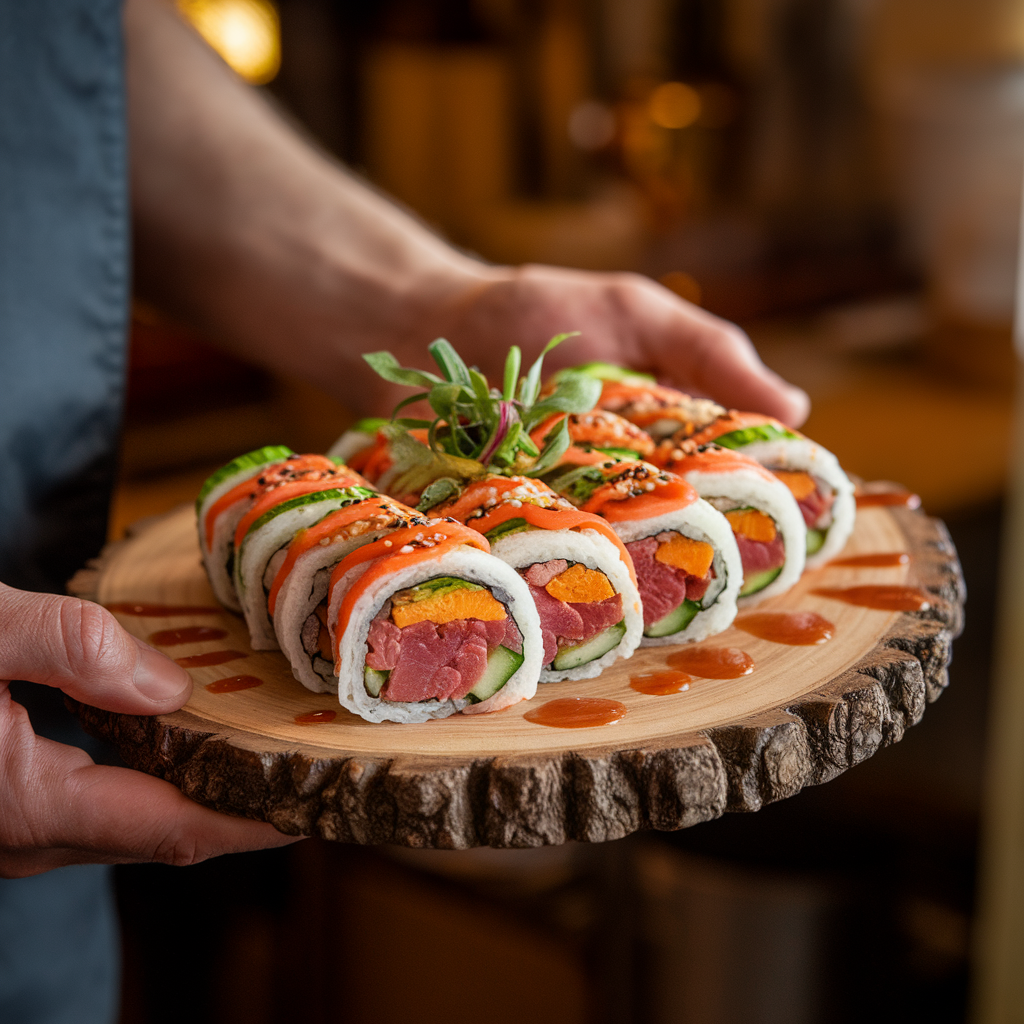
📦 Great for Meal Prep & Gifting
Hosting a potluck? Making school lunch? Spicy Tuna Kimbap travels well in bento boxes, Tupperware, or even eco-friendly beeswax wraps. It’s one of the most versatile, transportable recipes you’ll ever find.
🍽 Nutritional Info (Per Roll – 8 Slices)
- Calories: 330–370
- Protein: 14g
- Carbs: 42g
- Fat: 11g
- Sodium: Moderate (watch gochujang/soy levels)
This roll is rich in protein, omega-3s, and essential minerals—a great choice for health-conscious eaters.
🧠 Did You Know?
- Seaweed (Gim) is rich in iodine and antioxidants.
- Gochujang is a fermented food, good for your gut.
- Kimbap was invented during the Joseon Dynasty and popularized as a portable lunch food during Korea’s modernization period.
🌍 Global Inspiration
Kimbap is catching on worldwide! In Italy, it’s a healthy alternative to paninis. In Egypt, it’s a trendy party snack. In the U.S., it’s a TikTok favorite among college students. Whatever your food culture, Kimbap fits right in.
🧾 Final Thoughts: Why You Should Try Spicy Tuna Kimbap Today
Simple. Flavorful. Healthy. Customizable. Spicy Tuna Kimbap is more than a roll—it’s an experience. It’s a budget-friendly, low-effort, and meal-prep-friendly dish that brings together texture, taste, and tradition in one tight wrap.
Whether you’re a beginner cook or a seasoned home chef, this dish is a guaranteed crowd-pleaser. It also opens the door to more Korean recipes and Asian fusion dishes in your kitchen.




